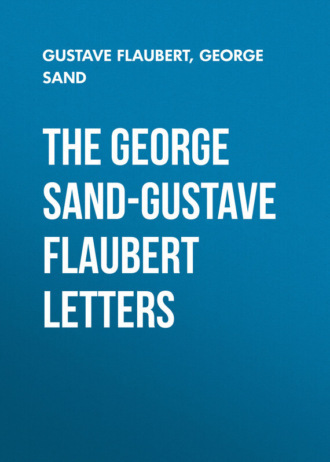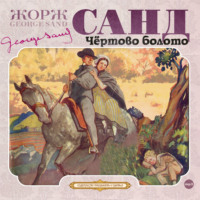 полная версия
полная версияThe George Sand-Gustave Flaubert Letters
I have packed and sent by EXPRESS a good proof of Couture's picture, signed by the engraver, my poor friend, Manceau. It is the best that I have and I have only just found it. I have sent with it a photograph of a drawing by Marchal which was also like me; but one changes from year to year. Age gives unceasingly another character to the face of people who think and study, that is why their portraits do not look like one another nor like them for long. I dream so much and I live so little, that sometimes I am only three years old. But, the next day I am three hundred, if the dream has been sombre. Isn't it the same with you? Doesn't it seem at moments, that you are beginning life without even knowing what it is, and at other times don't you feel over you the weight of several thousand centuries, of which you have a vague remembrance and a sorrowful impression? Whence do we come and whither do we go? All is possible since all is unknown.
Embrace your beautiful, good mother for me. I shall give myself a treat, being with you two. Now try to find that hoax on the Celtic stones; that would interest me very much. When you saw them, had they opened the galgal of Lockmariaker and cleared away the ground near Plouharnel?
Those people used to write, because there are stones covered with hieroglyphics, and they used to work in gold very well, because very beautifully made torques [Footnote: Gallic necklaces.] have been found.
My children, who are, like myself, great admirers of you, send you their compliments, and I kiss your forehead, since Sainte-Beuve lied.
G. Sand
Have you any sun today? Here it is stifling. The country is lovely.
When will you come here?
XIX. TO GEORGE SAND
Croisset, Saturday evening, … 1866
Good, I have it, that beautiful, dear and famous face! I am going to have a large frame made and hang it on my wall, being able to say, as did M. de Talleyrand to Louis Philippe: "It is the greatest honor that my house has received"; a poor phrase, for we two are worth more than those two amiable men.
Of the two portraits, I like that of Couture's the better. As for
Marchal's he saw in you only "the good woman," but I who am an old
Romantic, find in the other, "the head of the author" who made me dream so much in my youth.
XX. TO GEORGE SAND
Croisset, Saturday evening, 1866
Your sending the package of the two portraits made me think that you were in Paris, dear master, and I wrote you a letter which is waiting for you at rue des Feuillantines.
I have not found my article on the dolmens. But I have my manuscript (entire) of my trip in Brittany among my "unpublished works." We shall have to gabble when you are here. Have courage.
I don't experience, as you do, this feeling of a life which is beginning, the stupefaction of a newly commenced existence. It seems to me, on the contrary, that I have always lived! And I possess memories which go back to the Pharaohs. I see myself very clearly at different ages of history, practising different professions and in many sorts of fortune. My present personality is the result of my lost personalities. I have been a boatman on the Nile, a leno in Rome at the time of the Punic wars, then a Greek rhetorician in Subura where I was devoured by insects. I died during the Crusade from having eaten too many grapes on the Syrian shores, I have been a pirate, monk, mountebank and coachman. Perhaps also even emperor of the East?
Many things would be explained if we could know our real genealogy. For, since the elements which make a man are limited, should not the same combinations reproduce themselves? Thus heredity is a just principle which has been badly applied.
There is something in that word as in many others. Each one takes it by one end and no one understands the other. The science of psychology will remain where it lies, that is to say in shadows and folly, as long as it has no exact nomenclature, so long as it is allowed to use the same expression to signify the most diverse ideas. When they confuse categories, adieu, morale!
Don't you really think that since '89 they wander from the point? Instead of continuing along the highroad which was broad and beautiful, like a triumphal way, they stray off by little sidepaths and flounder in mud holes. Perhaps it would be wise for a little while to return to Holbach. Before admiring Proudhon, supposing one knew Turgot? But le Chic, that modern religion, what would become of it!
Opinions chic (or chiques): namely being pro-Catholicism (without believing a word of it) being pro-Slavery, being pro-the House of Austria, wearing mourning for Queen Amelie, admiring Orphee aux Enfers, being occupied with Agricultural Fairs, talking Sport, acting indifferent, being a fool up to the point of regretting the treaties of 1815. That is all that is the very newest.
Oh! You think that because I pass my life trying to make harmonious phrases, in avoiding assonances, that I too have not my little judgments on the things of this world? Alas! Yes! and moreover I shall burst, enraged at not expressing them.
But a truce to joking, I should finally bore you.
The Bouilhet play will open the first part of November. Then in a month we shall see each other.
I embrace you very warmly, dear master.
XXI. TO GUSTAVE FLAUBERT, at Croisset
Nohant, Monday evening, 1 October, 1866
Dear friend,
Your letter was forwarded to me from Paris. It isn't lost. I think too much of them to let any be lost. You don't speak to me of the floods, therefore I think that the Seine did not commit any follies at your place and that the tulip tree did not get its roots wet. I feared lest you were anxious and wondered if your bank was high enough to protect you. Here we have nothing of that sort to be afraid of; our streams are very wicked, but we are far from them.
You are happy in having such clear memories of other existences. Much imagination and learning – those are your memories; but if one does not recall anything distinct, one has a very lively feeling of one's own renewal in eternity. I have a very amusing brother who often used to say "at the time when I was a dog. …" He thought that he had become man very recently. I think that I was vegetable or mineral. I am not always very sure of completely existing, and sometimes I think I feel a great fatigue accumulated from having lived too much. Anyhow, I do not know, and I could not, like you, say, "I possess the past."
But then you believe that one does not really die, since one LIVES AGAIN? If you dare to say that to the Smart Set, you have courage and that is good. I have the courage which makes me pass for an imbecile, but I don't risk anything; I am imbecile under so many other counts.
I shall be enchanted to have your written impression of Brittany, I did not see enough to talk about. But I sought a general impression and that has served me for reconstructing one or two pictures which I need. I shall read you that also, but it is still an unformed mass.
Why did your trip remain unpublished? You are very coy. You don't find what you do worth being described. That is a mistake. All that issues from a master is instructive, and one should not fear to show one's sketches and drawings. They are still far above the reader, and so many things are brought down to his level that the poor devil remains common. One ought to love common people more than oneself, are they not the real unfortunates of the world? Isn't it the people without taste and without ideals who get bored, don't enjoy anything and are useless? One has to allow oneself to be abused, laughed at, and misunderstood by them, that is inevitable. But don't abandon them, and always throw them good bread, whether or not they prefer filth; when they are sated with dirt they will eat the bread; but if there is none, they will eat filth in secula seculorum.
I have heard you say, "I write for ten or twelve people only." One says in conversation, many things which are the result of the impression of the moment; but you are not alone in saying that. It was the opinion of the Lundi or the thesis of that day. I protested inwardly. The twelve persons for whom you write, who appreciate you, are as good as you are or surpass you. You never had any need of reading the eleven others to be yourself. But, one writes for all the world, for all who need to be initiated; when one is not understood, one is resigned and recommences. When one is understood, one rejoices and continues. There lies the whole secret of our persevering labors and of our love of art. What is art without the hearts and minds on which one pours it? A sun which would not project rays and would give life to no one.
After reflecting on it, isn't that your opinion? If you are convinced of that, you will never know disgust and lassitude, and if the present is sterile and ungrateful, if one loses all influence, all hold on the public, even in serving it to the best of one's ability, there yet remains recourse to the future, which supports courage and effaces all the wounds of pride. A hundred times in life, the good that one does seems not to serve any immediate use; but it keeps up just the same the tradition of wishing well and doing well, without which all would perish.
Is it only since '89 that people have been floundering? Didn't they have to flounder in order to arrive at '48 when they floundered much more, but so as to arrive at what should be? You must tell me how you mean that and I will read Turgot to please you. I don't promise to go as far as Holbach, ALTHOUGH HE HAS SOME GOOD POINTS, THE RUFFIAN!
Summon me at the time of Bouilhet's play. I shall be here, working hard, but ready to run, and loving you with all my heart. Now that I am no longer a woman, if the good God was just, I should become a man; I should have the physical strength and would say to you: "Come let's go to Carthage or elsewhere." But there, one who has neither sex nor strength, progresses towards childhood, and it is quite otherwhere that one is renewed; WHERE? I shall know that before you do, and, if I can, I shall come back in a dream to tell you.
XXII. TO GUSTAVE FLAUBERT
Nohant, 19 October
Dear friend, they write me from the Odeon that Bouilhet's play is on the 27th. I must be in Paris the 26th. Business calls me in any event. I shall dine at Magny's on that day, and the next, and the day after that. Now you know where to find me, for I think that you will come for the first performance. Yours always, with a full heart,
G. Sand
XXIII. TO GUSTAVE FLAUBERT
Nohant, 23 October, 1866
Dear friend, since the play is on the 29th I shall give two more days to my children and I leave here the 28th. You have not told me if you will dine with me and your friend on the 29th informally, at Magny's at whatever hour you wish. Let me find a line at 97 rue des Feuillantines, on the 28th.
Then we shall go to your house, the day you wish. My chief talk with you will be to listen to you and to love you with all my heart. I shall bring what I have "ON THE STOCKS." That will GIVE ME COURAGE, as they say here, to read to you my EMBRYO. If I could only carry the sun from Nohant. It is glorious.
I embrace and bless you.
G. Sand
XXIV. TO GUSTAVE FLAUBERT
Paris, 10 November, 1866
On reaching Paris I learn sad news. Last evening, while we were talking – and I think that we spoke of him day before yesterday – my friend Charles Duveyrier died, a most tender heart and a most naive spirit. He is to be buried tomorrow. He was one year older than I am. My generation is passing bit by bit. Shall I survive it? I don't ardently desire to, above all on these days of mourning and farewell. It is as God wills, provided He lets me always love in this world and in the next.
I keep a lively affection for the dead. But one loves the living differently. I give you the part of my heart that he had. That joined to what you have already, makes a large share. It seems to me that it consoles me to make that gift to you. From a literary point of view he was not a man of the first rank, one loved him for his goodness and spontaneity. Less occupied with affairs and philosophy, he would have had a charming talent. He left a pretty play, Michel Perrin.
I travelled half the way alone, thinking of you and your mother at Croisset and looking at the Seine, which thanks to you has become a friendly GODDESS. After that I had the society of an individual with two women, as ordinary, all of them, as the music at the pantomime the other day. Example: "I looked, the sun left an impression like two points in my eyes." HUSBAND: "That is called luminous points," and so on for an hour without stopping.
I shall do all sorts of errands for the house, for I belong to it, do I not? I am going to sleep, quite worn out; I wept unrestrainedly all the evening, and I embrace you so much the more, dear friend. Love me MORE than before, because I am sad.
G. Sand
Have you a friend among the Rouen magistrates? If you have, write him a line to watch for the NAME Amedee Despruneaux. It is a civil case which will come up at Rouen in a few days. Tell him that this Despruneaux is the most honest man in the world; you can answer for him as for me. In doing this, if the thing is feasible, you will do me a personal favor. I will do the same for any friend of yours.
XXV. TO GUSTAVE FLAUBERT 11 November, 1866
I send you my friend Despruneaux in person. If you know a judge or two, – or if your brother could give him a word of support, do arrange it, I kiss you three times on each eye.
G. Sand
Five minutes' interview and that's all the inconvenience. Paris,
Sunday
XXVI. TO GEORGE SAND
Monday night
You are sad, poor friend and dear master; it was you of whom I thought on learning of Duveyrier's death. Since you loved him, I am sorry for you. That loss is added to others. How we keep these dead souls in our hearts. Each one of us carries within himself his necropolis.
I am entirely UNDONE since your departure; it seems to me as if I had not seen you for ten years. My one subject of conversation with my mother is you, everyone here loves you. Under what star were you born, pray, to unite in your person such diverse qualities, so numerous and so rare?
I don't know what sort of feeling I have for you, but I have a particular tenderness for you, and one I have never felt for anyone, up to now. We understood each other, didn't we, that was good.
I especially missed you last evening at ten o'clock. There was a fire at my wood-seller's. The sky was rose color and the Seine the color of gooseberry sirup. I worked at the engine for three hours and I came home as worn out as the Turk with the giraffe.
A newspaper in Rouen, le Nouvelliste, told of your visit to Rouen, so that Saturday after leaving you I met several bourgeois indignant at me for not exhibiting you. The best thing was said to me by a former sub-prefect: "Ah! if we had known that she was here … we would have … we would have …" he hunted five minutes for the word; "we would have smiled for her." That would have been very little, would it not?
To "love you more" is hard for me – but I embrace you tenderly. Your letter of this morning, so melancholy, reached the BOTTOM of my heart. We separated at the moment when many things were on the point of coming to our lips. All the doors between us two are not yet open. You inspire me with a great respect and I do not dare to question you.
XXVII. TO GUSTAVE FLAUBERT, at Croisset
Paris, 13 November, 1866 Night from Tuesday to Wednesday
I have not yet read my play. I have still something to do over. Nothing pressing. Bouilhet's play goes admirably well, and they told me that my little friend Cadol's [Footnote: Edward Cadol, a dramatic author and a friend of Maurice Sand.] play would come next. And, for nothing in the world, do I want to step on the body of that child. That puts me quite a distance off and does not annoy me – NOR INJURE ME AT ALL. What style! Luckily I am not writing for Buloz.
I saw your friend last evening in the foyer at the Odeon. I shook hands with him. He had a happy look. And then I talked with Duquesnel about the fairy play. He wants very much to know it. You have only to present yourself when ever you wish to busy yourself with it. You will be received with open arms.
Mario Proth will give me tomorrow or next day the exact date on the transformation of the journal. Tomorrow I shall go out and buy your dear mother's shoes. Next week I am going to Palaiseau and I shall hunt up my book on faience. If I forget anything, remind me of it.
I have been ill for two days. I am cured. Your letter does my heart good. I shall answer all the questions quite nicely, as you have answered mine. One is happy, don't you think so, to be able to relate one's whole life? It is much less complicated than the bourgeois think, and the mysteries that one can reveal to a friend are always the contrary of what indifferent ones suppose.
I was very happy that week with you: no care, a good nesting-place a lovely country, affectionate hearts and your beautiful and frank face which has a somewhat paternal air. Age has nothing to do with it. One feels in you the protection of infinite goodness, and one evening when you called your mother "MY DAUGHTER," two tears came in my eyes. It was hard to go away, but I hindered your work, and then, – and then, – a malady of my old age is, not being able to keep still. I am afraid of getting too attached and of wearying others. The old ought to be extremely discreet. From a distance I can tell you how much I love you without the fear of repetition. You are one of the RARE BEINGS remaining impressionable, sincere, loving art, not corrupted by ambition, not drunk with success. In short you will always be twenty-five years of age because of all sorts of ideas which have become old-fashioned according to the senile young men of today. With them, I think it is decidedly a pose, but it is so stupid! If it is a weakness, it is still worse. They are MEN OF LETTERS and not MEN. Good luck to the novel! It is exquisite; but oddly enough there is one entire side of you which does not betray itself in what you do, something that you probably are ignorant of. That will come later, I am sure of it.
I embrace you tenderly, and your mother too, and the charming niece! [Footnote: Madame Caroline Commanville.] Ah! I forgot, I saw Couture this evening; he told me that in order to be nice to you, he would make your portrait in crayon like mine for whatever price you wish to arrange. You see I am a good commissioner, use me.
XXVIII. TO GUSTAVE FLAUBERT 16 November, 1866
Thanks, dear friend of my heart, for all the trouble that I gave you with my Berrichon Despruneaux. They are friends from the old country, a whole adorable family of fine people, fathers, children, wives, nephews, all in the close circle at Nohant. He must have been MOVED at seeing you. He looked forward to it, all personal interest aside. And I who am not practical, forgot to tell you that the judgment would not be given for a fortnight. That in consequence any preceding within the next two weeks would be extremely useful. If he gains his suit relative to the constructions at Yport, he will settle there and I shall realize the plan formed long since of going every year to his house; he has a delicious wife and they have loved me a long time. You then are threatened with seeing me often scratching at your gate in passing, giving you a kiss on the forehead, crying courage for your labor and running on. I am still awaiting our information on the journal. It seems that it is a little difficult to be exact for '42. I have asked for the most scrupulous exactitude.
For two days I have been taking out to walk my Cascaret, [Footnote: Francis Laur.] the little engineer of whom I told you. He has become very good looking, the ladies lift their lorgnons at him, and it depends only on him to attain the dignity of a negro "giraffier," but he loves, he is engaged, he has four years to wait, to work to make himself a position, and he has made a vow. You would tell him that he is stupid, I preach to him, on the contrary, my old troubadour doctrine.
Morality aside, I don't think that the children of this day have sufficient force to manage at the same time, science and dissipation, cocottes and engagements. The proof is that nothing comes from young Bohemia any longer. Good night, friend, work well, sleep well. Walk a little for the love of God and of me. Tell your judges who promised me a smile, to smile on my Berrichon.
XXIX. TO GUSTAVE FLAUBERT 16 November, 1866
Don't take any further steps. Contrary to all anticipations,
Despruneaux has gained his suit during the session.
Whether you have done it or not, he is none the less grateful about it and charges me to thank you with all his good and honest heart.
Bouilhet goes from better to better. I have just seen the directors who are delighted.
I love you and embrace you.
Think sometimes of your old troubadour. Friday
G. Sand
XXX. TO GUSTAVE FLAUBERT 18 November (?), 1866
I think that I shall give you pleasure and joy when I tell you that
La Conjuration d'Ambroise, thus says my porter, is announced as a real money-maker. There was a line this evening as at Villemer, and
Magny which is also a barometer, shows fair weather.
So be content, if that keeps up, Bouilhet is a success. Sunday
G. S.
XXXI. TO GUSTAVE FLAUBERT
Palaiseau, 22 November, 1866
I think that it will bring me luck to say good evening to my dear comrade before starting to work.
I am QUITE ALONE in my little house. The gardener and his family live in the pavilion in the garden and we are the last house at the end of the village, quite isolated in the country, which is a ravishing oasis. Fields, woods, appletrees as in Normandy; not a great river with its steam whistles and infernal chain; a little stream which runs silently under the willows; a silence … ah! it seems to me that I am in the depths of the virgin forest: nothing speaks except the little jet of the spring which ceaselessly piles up diamonds in the moonlight. The flies sleeping in the corners of my room, awaken at the warmth of my fire. They had installed themselves there to die, they come near the lamp, they are seized with a mad gaiety, they buzz, they jump, they laugh, they even have faint inclinations towards love, but it is the hour of death and paf! in the midst of the dance, they fall stiff. It is over, farewell to dancing!
I am sad here just the same. This absolute solitude, which has always been vacation and recreation for me, is shared now by a dead soul [Footnote: Alexandre Manceau, the engraver, a friend of Maurice Sand.] who has ended here, like a lamp which is going out, yet which is here still. I do not consider him unhappy in the region where he is dwelling; but the image that he has left near me, which is nothing more than a reflection, seems to complain because of being unable to speak to me any more.
Never mind! Sadness is not unhealthy. It prevents us from drying up. And you dear friend, what are you doing at this hour? Grubbing also, alone also; for your mother must be in Rouen. Tonight must be beautiful down there too. Do you sometimes think of the "old troubadour of the Inn clock, who still sings and will continue to sing perfect love?" Well! yes, to be sure! You do not believe in chastity, sir, that's your affair. But as for me, I say that SHE HAS SOME GOOD POINTS, THE JADE!
And with this, I embrace you with all my heart, and I am going to, if I can, make people talk who love each other in the old way.
You don't have to write to me when you don't feel like it. No real friendship without ABSOLUTE liberty.
In Paris next week, and then again to Palaiseau, and after that to Nohant. I saw Bouilhet at the Monday performance. I am CRAZY about it. But some of us will applaud at Magny's. I had a cold sweat there, I who am so steady, and I saw everything quite blue.
XXXII. TO GEORGE SAND
Croisset, Tuesday
You are alone and sad down there, I am the same here.
Whence come these attacks of melancholy that overwhelm one at times? They rise like a tide, one feels drowned, one has to flee. I lie prostrate. I do nothing and the tide passes.
My novel is going very badly for the moment. That fact added to the deaths of which I have heard; of Cormenin (a friend of twenty-five years' standing), of Gavarni, and then all the rest, but that will pass. You don't know what it is to stay a whole day with your head in your hands trying to squeeze your unfortunate brain so as to find a word. Ideas come very easily with you, incessantly, like a stream. With me it is a tiny thread of water. Hard labor at art is necessary for me before obtaining a waterfall. Ah! I certainly know THE AGONIES OF STYLE.









